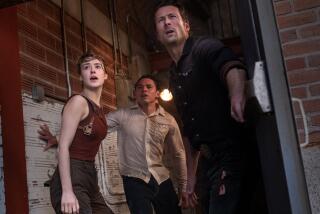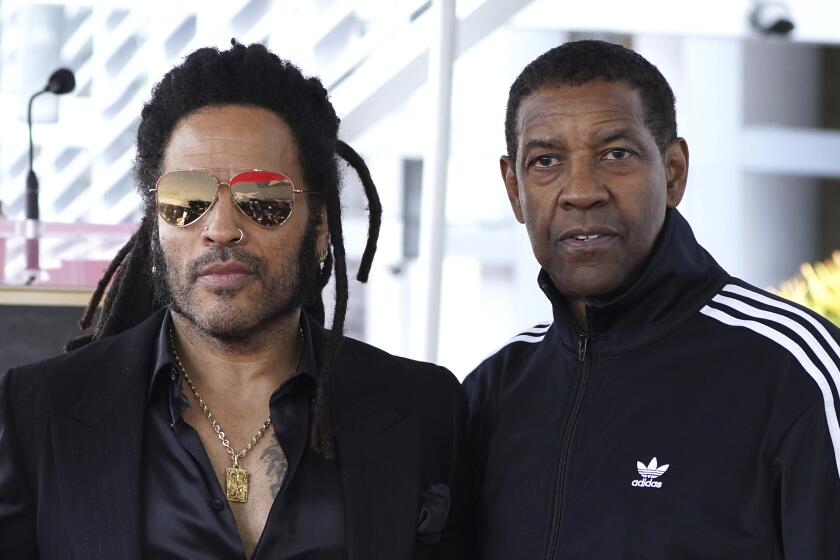Going to Extremes
The human drama inherent in attempting to reconcile nearly irreconcilable opposites proved potent enough to capture both halves of the Sundance Film Festival’s Grand Jury Prize, with Henry Bean’s “The Believer” taking the dramatic award and Kate Davis’ “Southern Comfort” winning on the documentary side.
Powered by a fierce, compelling performance by Ryan Gosling, the smart, provocative “Believer” was an unexpected but popular choice for the top prize. Written as well as directed by Bean and based on a true story that’s been on his mind for 25 years, this is an intensely verbal and discomforting character study about a young Orthodox Jew who becomes a violent neo-Nazi only to find that it as difficult to live without his Judaism as it is to live with it.
“The only reason I was willing to submit this film to Sundance was because I thought we’d never get in,” Bean said in accepting the award Saturday night. “To have won something is incredible.”
The intimate, moving “Southern Comfort,” which filmmaker Davis shot on a digital camera, often with herself as her only crew, involves us in the life of Robert Eads, a 52-year-old female-to-male transsexual who, his impeccably masculine presence notwithstanding, is both dying of ovarian cancer and falling in love with a male-to-female transsexual named Lola Cola.
A truly mind-bending film, disorienting in the best possible way, “Southern Comfort” not only gives us a caring, accepting look at a rarely examined world, it also expands our sense of what human sexuality can encompass. “Being a man or being a woman has nothing to do with your genitalia,” Eads says. “It’s what’s in your mind or in your heart.”
“Yes, it’s a struggle to make films, but people willing to put their private lives on screen show a courage I simply can’t imagine,” Davis said, restating the film’s thrust when she simply added, “transgender people are people.”
The festival’s Waldo Salt Screenwriting Award went to Christopher Nolan for his compelling, intricately structured “Memento,” based on a short story by his brother Jonathan, an inventive backward thriller that follows star Guy Pearce as a defective detective who is trying to solve his wife’s rape and murder despite not being able to remember anything for more than a few minutes.
In an unusual coincidence, two films won the same pair of prizes on opposite sides of the Sundance divide. For dramas, “Hedwig and the Angry Inch” took both the Audience Award and, in something of a surprise, the Directing Award as well; “Dogtown and Z-Boys” duplicated that feat for documentaries.
John Cameron Mitchell both stars in and directed “Hedwig,” an adaptation of the popular off-Broadway play about a German-American performance diva he created with musician-lyricist Stephen Trask. The story of an “internationally ignored rock ‘n’ roll icon” whose Dietrichesque persona and waspish sense of humor comes from a failed sex-change operation (could this be a Sundance trend?), “Hedwig” makes good use of Trask’s peppy songs and Mitchell’s charismatic performing skills.
“Z-Boys,” directed by Stacy Peralta, examines a classic Los Angeles phenomenon, the acrobatic skateboarding that began in the Dogtown area, where Venice meets Ocean Park, and went on to spark the entire extreme sports subculture. Peralta, one of the original Zephyr skating team, alternates spiffy 1970s skating footage with contemporary interviews with his buddies, still pleased to be bad boys after all these years.
“When I began my life as a kid riding a skateboard, I never thought it would lead to this,” said Peralta, a bit dazed. He also sort of thanked Vans, the key source of the film’s funding. “They didn’t give us enough money, but they outfitted everyone with shoes.”
“Z-Boys” shared its documentary audience award with the very different “Scout’s Honor” (which also took the Freedom of Expression prize). Directed by Tom Shepard, that film examines the attempt of the Boy Scouts to exclude gays through the frame of two straight scouting enthusiasts from Petaluma, Calif., 13-year-old Steven Cozza and 69-year-old Dave Rice, who founded Scouting for All to try and turn things around. Executive producer D. Stuart Harrison, an ex-Scout, made a point of thanking the attacked organization: “the Boy Scouts,” he said, “taught me how to raise money.”
*
Two of the festival’s best received films, “The Deep End” (just acquired by Fox Searchlight) and “LaLee’s Kin: The Legacy of Cotton,” were heavily indebted to their directors of photography, and both ended up with their respective cinematography awards.
It’s hard to imagine “The Deep End’s” modernized melodramatic doings without Giles Nuttgens’ beautifully modulated camera work. And Albert Maysles’ effortless, contemplative shooting style helps make his film the most artistic documentary in the competition.
A veteran of such classics as “Primary,” “Salesman,” “Gimme Shelter” and “Grey Gardens,” Maysles paid tribute to co-director Susan Froemke, “my collaborator for the 14 years since my brother David’s death. I never thought anyone could fill the place of my brother, but she has filled it so beautifully.”
Both the dramatic and the documentary juries awarded one Special Jury Prize apiece. The doc special prize was won by “Children Underground,” Edet Belzberg’s devastating look at homeless kids living painful lives in a subway station in Bucharest, Romania. On the dramatic side, the award went to the peerless acting of Sissy Spacek and Tom Wilkinson in the emotionally wrenching family drama “In the Bedroom” (acquired by Miramax mid-festival). Accepting for the winners, “Bedroom” director Todd Field, himself an actor, said the pair “went beyond. They really, really went to some very scary places together.”
Though they didn’t win any prizes, a pair of thoughtful, comprehensive documentaries deserve mention for the way they explore the public lives of two African Americans, men who were as significant as they were different. William Greaves’ “Ralph Bunche: An American Odyssey” examines the partially forgotten accomplishments of the master negotiator and winner of the 1950 Nobel Peace Prize; Stanley Nelson’s “Marcus Garvey: Look for Me in the Whirlwind” rediscovers the significance of the creator of what the film calls the largest black movement in American history.
In Sundance’s world cinema section, home to perennially overlooked films, the audience award went to veteran Chinese director’s Zhang Yimou’s “The Road Home,” notable for being the film debut of “Crouching Tiger, Hidden Dragon’s” youngest co-star, Zhang Ziyi.
One of the most satisfying foreign films at the festival was “Divided We Fall,” which is also Czechoslovakia’s nominee for the best foreign language film Oscar. Made by the team of director Jan Hrebejk and screenwriter Petr Jarchovsky, it’s a tale of the moral complications and farcical chaos that result when a couple decide half against their will to shelter a Jewish escapee during the height of the Nazi occupation. It blends bittersweet comedy and an ironic sensibility that is reminiscent of the classic Czech films of decades past.
(Over at the rival Slamdance, the awards had an international tinge as well, with two Korean films, “Memento Mori” and “Barking Dogs Never Bite,” respectively taking the cinematography and editing awards. For the first time ever, a documentary, Monteith McCollum’s “Hybrid,” about a 100-year-old farmer’s passion for seed corn, won Slamdance’s Grand Jury Award. It and other winners will be visible at the American Cinematheque’s Best of Slamdance screenings Feb. 7-8 at the Egyptian Theater in Hollywood.)
Other Sundance winners include the prize in short filmmaking going to Paul Harrill’s “Gina, an Actress, Age 29” and the prize in Latin American Cinema to both Mexico’s “Without a Trace,” directed by Maria Navaro, and, from Brazil, “Possible Loves,” directed by Sandra Werneck.
The Latin American jury didn’t feel it could rest without bestowing a Special Jury Mention to one of the strangest films in all of Sundance, Andre Barcinski and Ivan Finotti’s digital documentary on a legendary Brazilian horrormeister (“the Bela Lugosi of the tropics” the jury proclaimed) called “Coffin Joe: The Strange World of Jose Mojica Marins.”
Apparently the most censored filmmaker in his country’s history, Marins made gleefully bizarre, almost surreal horror films with titles such as “At Midnight I’ll Take Your Soul” and “This Night I’ll Possess Your Corpse” before being forced by censorship to tackle even stranger sex films. Those who think of Sundance as the exclusive domain of sensitive aesthetes and Hollywood hopefuls have never made the acquaintance of the disconcerting Coffin Joe.
More to Read
Only good movies
Get the Indie Focus newsletter, Mark Olsen's weekly guide to the world of cinema.
You may occasionally receive promotional content from the Los Angeles Times.







